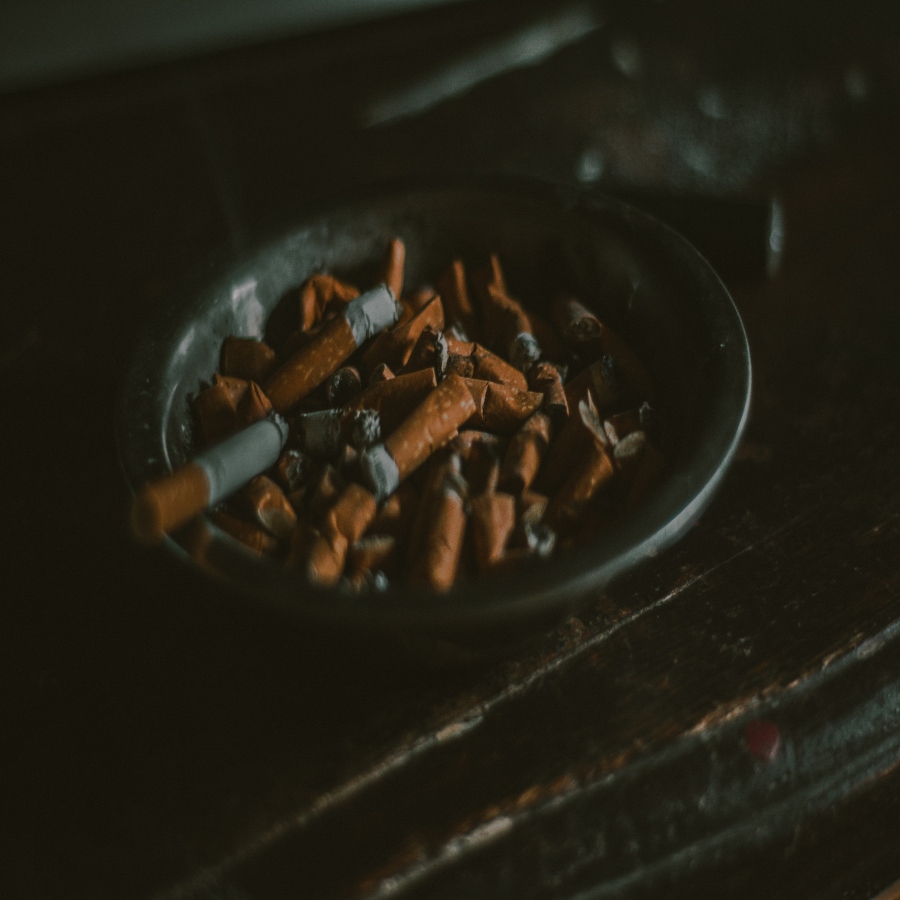It is a cast-iron frying pan filled with cigarette butts. The handle is just the right size for my hand and just out of reach on the freezer. It is an ashtray. That’s all it is, and I don’t want it. “You don’t want that,” Momma has told me many times, so I try not to. Momma is smoking a cigarette and quartering chickens on the top of the deep freezer, where the bloody water runs down yellow, yolkish. She moves the frying pan closer to her when I come near but does not wipe the trickle. I pat the freezer, so cold inside but so warm along this wall, and the chicken water wets me. It is a tight spot at the back of the house where the kitchen meets the back bedroom, where Daddy keeps the fire burning with morsels of tractor tire.
I stand in the bedroom doorway and look in at Daddy, who smiles as if he has just come back from far away. I smile back without anything to say. A brown blanket over the window keeps the room amber-dark all day long, but I’m not allowed in there except to say good night. It’s not time to say good night, so I watch Daddy polish his boots from the threshold. He sits on the edge of the bed, legs crossed like a woman. One leg has a lot of muscle but the other one is thin because he stepped on a grenade in Vietnam. He crosses the thin leg over the top and he can’t feel whether it’s uncomfortable or not. The thin leg doesn’t fall asleep. It prickles all on its own, he says.
On the footboard of the bed, a cut-crystal jewel collects ashes. It’s an ashtray, too. Daddy’s cigarette is burning into a rope of ash all by itself. “Come on out of there,” Momma says, slopping something into the scrap bucket. Her arms have the same goosebumps as the chicken skin. I edge back on the threshold and pull a wet pinfeather from the ruching of my blouse. The facets of the crystal ashtray turn the blanket-curtain light lavender, yellow. If I had my way I would stand at the footboard, the warmth of the fire on my back, and look through the glass at Daddy. But this is as close as I can go until it’s time to say good night.
I don’t know why Daddy polishes his boots, but he does it every day. His boots are massive, black, with a hundred eyelets and a mile of laces. Their stiffness helps him walk even if he can’t feel much in his leg. On the sole of his thin-leg boot, he tacked on a wedge of old tractor tire, to make his legs the same length. It helps even out his limp. Daddy polishes his boots with boar-bristle brushes that he keeps in a wooden shoeshine box. His box is full of shoe polish tins, round ones with crimped lids I can open with my teeth. I cannot open the tin of Momma’s sewing supplies, having chipped my tooth trying. Tins are hard to open for a reason. Daddy hands the polish to me and lets me try. He smiles as my mouth puckers. Then my chicken-water hands slick up the lid and his face darkens.
Vietnam is a place, and also a war before I was born. It is located just past the bedroom doorframe. It is as solid an object as an ashtray and emits more smoke. I don’t want it, so I try to leave it alone, forget about it.
Like many things, shoe polish is bitter and leaves a lasting residue. “Don’t put that in your mouth,” Momma tells me. She pinches her words around the cigarette on her lip and I notice she has moved the frying pan again. In another house, perhaps one that existed before and further away from Vietnam, it would be a child’s toy, perfectly sized for cooking pretend eggs. But in this house, it is an ashtray.
I wipe the tin on my blouse until the kiwi on the top is bright. The black crescent in my ruching won’t come out, though Momma will try. I return the polish to Daddy’s palm and calm returns to the facets of his face.

